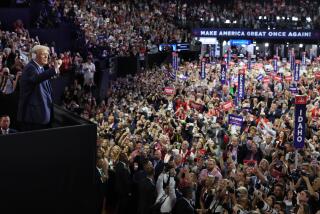Jeb Bush Tries to Hasten Thaw, Gets the Cold Shoulder
- Share via
TALLAHASSEE, Fla. — It was an icy, raw political climate Gov. Jeb Bush faced the day after his older brother laid claim to the presidency.
First, his close friend Tom Feeney, the conservative speaker of the Florida House, inflamed Democrats by saying “What a loser” during Al Gore’s concession speech.
Then African American lawmakers complained Bush failed to invite them to the announcement of a blue-ribbon task force on election reform.
On top of that, deep, seemingly impassable chasms remain between Democratic and Republican legislators who divided bitterly over whether to intervene in the election dispute.
About the only good news Bush got from state politicians Thursday was the decision by the Florida Senate to table a measure passed by the Florida House to directly appoint the state’s presidential electors. That measure is now dead, and the Legislature, which took the controversial step of convening a special session last week to deliberate the issue, adjourned for the year.
Asked about his own political prospects, Bush demurred.
“I don’t think much about my political future right now,” the governor told a room full of reporters. “We’re in the holiday season now, and I think it’s appropriate for everyone to take a deep breath and focus on spending time with their families.”
Later, when asked about the level of discord between the two major political parties, Bush simply said: “People’s emotions are very high. My philosophy has always been not to take it personally.”
Bush’s remarks were overshadowed by Feeney’s statements regarding Gore. Feeney salted fresh wounds when he was overheard in a restaurant making the “loser” remark. He also called the address “an evil speech.”
Feeney apologized Thursday, describing his remarks quoted in many local papers as “just a joke.”
Feeney ran as Bush’s lieutenant governor in Bush’s first, unsuccessful gubernatorial bid in 1994. His fiery speeches about “constitutional duty” and “history in the making” helped galvanize lawmakers in the Republican-dominated Legislature to try to directly appoint a slate of electors loyal to George W. Bush.
Several Democratic lawmakers were outraged by Feeney’s comments Wednesday night and boycotted the election reform news conference Bush had organized Thursday. Conspicuously absent was Tom Rossin, the West Palm Beach Democrat and Senate minority leader.
“What Feeney said was not excusable in any way,” Rossin said. “I didn’t want to be seen at the podium with him.”
Also, African American legislators said it was wrong for Bush to exclude them from the news conference after the volume of voting complaints logged in black communities this last month. Relations between Bush and black legislators have been touchy for some time, partly due to an executive order Bush signed last year ending the state’s affirmative action policies.
“Voter disenfranchisement is an issue that deeply affects us, and we should have been invited,” said Al Lawson, a state senator from Tallahassee. “It shows a lack of sensitivity right from the get-go.”
Black lawmakers have said they will form their own election reform task force because they don’t trust Jeb Bush to help them. Already, the Florida Legislature’s black caucus has enlisted the support of the Rev. Jesse Jackson and the U.S. Department of Justice to investigate allegations of voter discrimination. Though they were not invited to the announcement Thursday, two black lawmakers have been asked to sit on the 21-member election task force, a Bush spokeswoman said.
Bush clearly had hoped to bring divided politicians together by quickly forming a bipartisan task force to address Florida’s election problems that everyone from Tallahassee to Tehran probably knows about by now. The governor has given the group a broad mandate to study everything from voting machine technology and election contest procedures to voter registration. Bush’s staff has estimated that it could cost up to $200 million to modernize Florida’s election equipment to ensure that a close election does not turn the system on its head again.
The task force is supposed to report back to Bush by March 1.
Secretary of State Katherine Harris, who had withdrawn from center stage of the election drama after playing a leading role last month, spoke publicly Thursday for the first time in weeks. She said she had received 750,000 e-mails in the five weeks since the election, many of them suggestions about ways to improve election procedures.
“This election showed that the fundamental process of democracy remains sound,” Harris said. “Yet we need to address the practical aspects of voting.”
An hour after Bush and Harris announced the task force, the Florida Senate took the expected action of killing the measure to directly appoint electors.
On Tuesday, the House took the first step in the enormously controversial effort by passing a resolution by a vote of 79 to 41.
But after Gore conceded Wednesday night, Senate President John McKay said such a measure was no longer necessary. He adjourned lawmakers without even addressing it.
“Our goal was always to make sure there was finality, and however that was achieved was immaterial,” McKay said. “With the vice president’s gracious comments, finality was achieved.”
More to Read
Sign up for Essential California
The most important California stories and recommendations in your inbox every morning.
You may occasionally receive promotional content from the Los Angeles Times.













